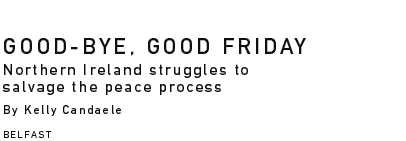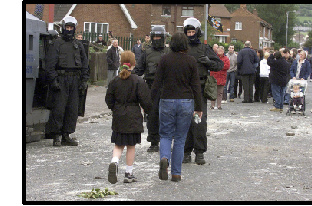
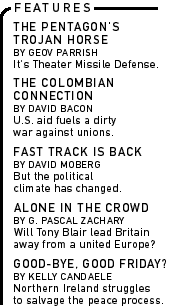
|
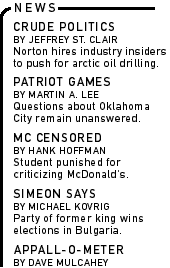
|
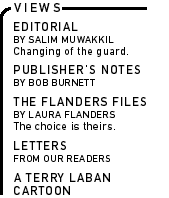
|
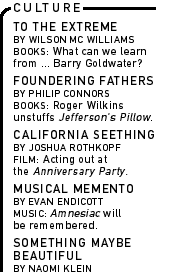
|
|
|
| |
|
|
|
On Election Day in Northern Ireland, David Trimble, leader of the Ulster Unionist Party (UUP) and first minister in the Northern Ireland Assembly, was roughed up by Democratic Unionist Party (DUP) supporters as he approached his polling station to vote. Trimble needed the protection of the Royal Ulster Constabulary (RUC) to get in and out of the building unharmed and ended up with a few bruises. When the votes were counted the next day, most observers concluded that the DUP had roughed up and bruised the peace process as well, winning three closely watched races against the UUP. Trimble's party lost three parliamentary seats overall, reducing their parliamentary total from nine to six, while the Rev. Ian Paisley's party gained two Westminster seats, raising their total to five. (Northern Ireland is represented by 18 seats in the House of Commons.) Trimble won by only 2,000 votes in his own constituency, a seat he had taken by more than 10,000 votes in 1997. In the local elections, the UUP lost 31 seats, many to DUP challengers. The DUP saw its share of the vote go from 13.6 percent in 1997 to 22.5 percent. In characteristic form, Paisley claimed that the majority of unionists were now against the Good Friday peace agreement and called upon Trimble to leave office for "destroying unionism." Meanwhile, Sinn Fein surged past the Social Democratic and Labour Party as the
But working things out in Northern Ireland has become more difficult. The election results--both parliamentary and local council races were held on the same day--reinforced the reality that implementation of the Good Friday agreement has become more difficult than negotiating it. Even though Trimble is the most visible pro-agreement unionist in Northern Ireland, he has led a deeply divided party into the devolved assembly. He has barely survived a number of leadership challenges over issues that would have destroyed previous UUP leaders. While Trimble is respected, even by nationalist politicians who acknowledge his political difficulties, he has allowed intransigent unionists, a group who continue to mourn their loss of domination, to shape the political debate. The two biggest issues have been decommissioning Irish Republican Army weapons and police reform. While the IRA has allowed three inspections of arms dumps--an unprecedented action--unionist voters punished Trimble over the failure of the IRA to move toward full weapons decommissioning and for what they regard as the "gutting" of the RUC. Reforms of the RUC that would seem mild in another context--recruiting a 50 percent Catholic force and establishing an independent oversight commission--have become political and symbolic indicators of which "community" is gaining or losing ground. Since the IRA cease-fire in 1994 that initiated the current peace process, Sinn Fein has stated that they want to remove all guns from Northern Irish politics but only in the context of an overall implementation of the Good Friday agreement. That means thorough reform of the police force and removal of the British security apparatus, particularly in the border county of Armagh. As a result of the June 7 election, Trimble's maneuvering room on weapons has been dramatically narrowed. In an attempt to silence criticism from within his own party and from Paisley, Trimble had promised to resign as first minister of the Assembly on July 1 if the IRA had not commenced arms decommissioning by that date. Trimble was fishing for IRA support he is unlikely to get. But there is increasing pressure for the IRA to move in that direction. Last week, Bertie Ahern, prime minister of the Republic of Ireland, called upon Sinn Fein to put pressure on the IRA to move beyond inspections of weapons to permanent removal. Sinn Fein President Gerry Adams all but ruled out an IRA response by Trimble's deadline. It's hard to determine whether Sinn Fein's electoral mandate will allow them to move the IRA forward on arms decommissioning or make them more intransigent. It is clear that Sinn Fein's political strategy has been successful beyond even their expectations. The hope is that electoral success will knit them more firmly into the democratic process. But there is historic precedent for a British general election tragically impacting the search for peace in Northern Ireland. In 1973 and 1974, a previous attempt to establish a power-sharing government was made. The so-called Sunningdale agreement established an assembly and executive cabinet with both unionists and nationalists participating. Sunningdale also created a Council of Ireland that gave the Dublin government a consultative role in Northern Irish affairs, not unlike the North/South Ministerial Council that is part of the current arrangement. In February 1974, Prime Minister Edward Heath called a general election. With 30,000 security forces patrolling the streets of Northern Ireland, unionists who campaigned against Sunningdale won eleven of twelve seats. Brian Faulkner, leader of the largest unionist party at the time, was forced to resign as party leader because of his support of Sunningdale. And in May of that year, the Protestant Ulster Workers Council called a general strike that as one historian observed, "almost broke up the fabric of civilized life in Ulster." The British government refused to use troops to break up the strike, and Northern Ireland's experiment in constitutional government ended abruptly. Twenty years of gruesome sectarian warfare followed. These days, the Good Friday agreement's finely crafted political institutions also seem on the verge of tumbling down. On a purely visceral level, both DUP voters and Sinn Fein supporters have reason to celebrate. Time will tell whether their gains will have a salutary effect on the peace process. But there are many who argue that in the long term, the "hollowing out" of the political center is not a good sign. Of course, one critical difference between the DUP and Sinn Fein is that Sinn Fein is supportive of the peace process and the DUP is not. If Trimble, who may have been given his walking papers in the aftermath of the election, is replaced as head of the UUP, his successor undoubtedly will insist on renegotiating the Good Friday agreement. That will not happen, but what would follow is unpredictable. The assembly could be suspended, or new elections could be called within a few months. Already, in late June some of the most serious rioting in recent years has taken place in North Belfast as nationalists and loyalists clashed. In an ominous sign, shots were fired from both sides--an indication of what might be to come if the political institutions cannot be saved. In another context, William Butler Yeats warned of the dire social
consequences of a "center" that would not hold. There is still an
overwhelming desire for peace in Northern Ireland. The assembly
has brought power to local communities and away from London, a very
popular development. Whether the popular will can overcome the centrifugal
forces let loose remains to be determined. Kelly Candaele has written extensively on Northern Ireland for the Los Angeles Times and other national publications.
|

